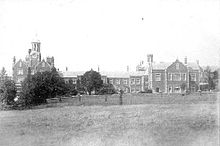Origins and prehistory of the NHS
This article describes Pre-Twentieth Century Healthcare, and the Origins (i.e. Prehistory) of the NHS. Even though there was by no means a nationalised state-funded health service, the foundations of what was to come were laid down in the 19th Century. But we start in the 16th Century.
Poor Law
In the 16th Century, the first Poor Law established almshouses to care for the poor and sick; with a system of ‘outdoor relief’; providing benefits in kind to support the poor at home.
During the first half of the 19th Century, almshouses, and outdoor relief were thought to encourage dependency. So the State abolished direct welfare payments and established workhouses, austere large institutions for the care of the needy.
Towards the end of the century, annexes were added to house the sick, the first infirmaries, in some respects, the first hospitals. Care was rudimentary with Florence Nightingale, amongst others, commenting on the atrocious conditions.
First professional bodies
Some of the Royal Colleges are very ancient. For example the Royal College of Physicians (London) was founded in 1518. Also the Company of Barbers and Surgeons was formed in 1540, when the Fellowship of Surgeons merged with the Barbers’ Company following an Act of Parliament.
First hospitals
As the anatomical and pathological basis of disease became better understood, healthcare was increasingly provided by other bodies. Local councils established both ‘Municipal Hospitals’ for infectious diseases (many of which became ‘District General Hospitals’), and institutions for people with mental or physical illnesses or intellectual disabilities.
Additionally, many ‘Voluntary Hospitals’ were established as charities where medical care was provided by visiting specialists (later called consultants, with registrars as deputies) who had lucrative private practice elsewhere. For economic reasons, such hospitals focused on people with acute problems not requiring long-term care. Some of these hospitals later became modern ‘teaching hospitals’.
Primary and community care
Primary and community care services evolved separately from the hospitals. Community care, including domiciliary, environmental and public health services, had always been the responsibility of the local authority. Regular epidemics, particularly of smallpox, typhus and cholera, drew attention to the need for sanitary and preventative measures.
So from the mid-nineteenth century, local health boards had legal powers to protect water supplies, promote vaccination and enforce quarantines. However, it was not until the beginning of the twentieth century, that a primary care doctor service (i.e. a ‘general practitioner’, GP) was funded through insurance schemes.
This is the early timeline of healthcare development, from 1800 onwards. The Victorians were intent on improving the nation’s health with pubic health reform.
The 1800s
The major priorities of the 1800s were public and mental health, and the prevention and control of infectious disease (including vaccination). New types of hospitals including asylums and cottage hospitals were born. Doctors were registered for the first time, leading to the start of their regulation.
1789-99 French Revolution
1796. Public Health. Discovery of vaccination. Edward Jenner, a British scientist, discovered that vaccinations could be a way of preventing disease.
1801 Kingdoms of Great Britain and Ireland merge to form the United Kingdom (lasted until formation of the Irish Free State in 1922)
1804 World population reaches 1 billion (now nearly 8 billion)
1808. Mental Health. County AsylumsArtichokes and potatoes Act 1808 established asylums for poor and criminally insane, mentally ill people; the first opening in Northampton in 1811.
1812 British Prime Minister Spencer Perceval is assassinated
1815. Education. Apothecaries Act 1815 introduced compulsory apprenticeship and formal qualifications for apothecaries (later called general practitioners, GPs), under the license of the Society of Apothecaries.
1820 British Monarch: George IV (1820-30)
1825 Stockton and Darlington Railway, the first public railway in the world, is opened
1828. Mental Health. County Asylums Act 1828 required magistrates to send annual records of admissions, discharges, and deaths in asylums to the Home Office. It also imposed the requirement of a residential medical officer.
1830 British Monarch: William IV (1830-37)
1832. Education. British Medical Association launched under the name of the Provincial Medical and Surgical Association; with the objective of sharing medical knowledge.
1833 Slavery Abolition Act bans slavery throughout the British Empire
1836. Public Health. Registration Act 1836 established the General Register Office and a national registration of births, marriages and deaths.
1837 British Monarch: Queen Victoria (1837-1901)
1839. Public Health. The Poor Law Commission’s fifth annual report. The report concluded the prevalence of disease was linked to substandard living conditions in England’s industrial cities.
1840. Public Health. Act to Extend the Practice of Vaccination 1840 – permitted Poor Law Union guardians to appoint medical officers to vaccinate people (including the poor) at public expense. UK’s first vaccination law.
1841. Education. UK Census estimated that a third of doctors in England were unqualified.
1842 William Clarke, a medical student at Berkshire Medical College (USA),
administered ether to Miss Hobbie for a dental extraction – first use of anaesthesia
1842. Public Health. Mines and Collieries Act 1842 forbade the use of boys younger than ten and women in the mines.
1842. Public Health. Report on the Sanitary Conditions of the Labouring Population of Great Britain. Edwin Chadwick found that there was a link between poor living standards and the spread of disease. He recommended that the government provide clean water, improve drainage systems, and enable councils to clear away refuse.
1845-49 Great Famine of Ireland leads to a Irish diaspora
1845. Mental Health. Lunacy Act 1845 and County Asylums Act 1845. The Lunacy Acts changed the status of mentally ill people to patients.

Hatton County Lunacy Asylum, which took its first patients in 1852. Originally called ‘Warwick County Lunatic Asylum’. It is now residential property.
1847. Public Health. First medical officer of health (in Liverpool). William Henry Duncan was appointed in January 1847 to ensure that sanitary conditions were improved in order to stem the spread of disease.
1848. Public Health. Public Health Act 1848 and the General Board of Health established the General Board of Health and Local Boards, to advise on public health matters. The Act gave towns the right to appoint a Local Board of Health, led by a Medical Officer (now the Director of Public Health, DPH).
1851 The Great Exhibition in London – world’s first International Expo or World Fair
1853-56 Crimean War between France, UK, Ottoman Empire and Russia
1853. Public Health. United Kingdom Vaccination Act 1853. Legislation made it compulsory for all children born after 1 August 1853 to be vaccinated against smallpox.
1854. Public Health. John Snow and the Broad Street pump. John Snow, an anaesthetist, speculated that cholera was spread by contaminated water, an idea which was not accepted by his peers or local authorities. He, famously, removed the handle of the Broad Street (water) pump, which he correctly thought was the source of a cholera outbreak.
 Broad Street Pump
Broad Street Pump
1854. Public Health. Improvements in Hospital Hygiene. Florence Nightingale returned from running military hospitals during the Crimean War, and instigated sanitary improvements in British hospitals, cementing the modern profession of nursing.
1858. Regulation. Medical Act 1858. General Medical Council (GMC) was formed centralising the regulation of doctors in the UK.
1858. Public Health. Public Health Act 1858 abolished the General Board of Health. Its responsibilities were taken on by the Secretary of State for the Home Department, the Local Government Act Office, and the Privy Council.
1859 Charles Darwin publishes On the Origin of Species, having discovered
Evolution through Natural Selection
1860. Clinical. Cottage hospital movement. Rural doctors started to establish small facilities that provided hospital services locally. When the NHS formed in 1848, 20% of hospitals were of this type. Most have now disappeared. Many feel that is a mistake.
1860. Education. The professionalisation of nursing. The first nursing school was set up at St Thomas’s by Mrs Wardroper and was supervised by Florence Nightingale.
1863 First section of London Underground opens
1863. Mental Health. Establishment of first forensic mental health hospital in England, Broadmoor Criminal Lunatic Asylum.
1864. Public Health. Contagious Diseases Act 1864. This was an attempt to regulate ‘common prostitutes’, in order to reduce the prevalence of sexually transmitted diseases within the British army and navy.
1865 Robert E. Lee surrenders to Ulysses S. Grant in Virginia, effectively ending American Civil War
1866. Public Health. Sanitary Act 1866 made it compulsory for local authorities to improve sanitary conditions and remove nuisances to public health.
1867. Public Health. Metropolitan Poor Act 1867 provided for the establishment of ‘asylums’ (another type of early hospital) for the sick and other classes of the poor in London. Though restricted to London, the Act began to influence services nationally.
1869 Suez Canal opens
1872 First international soccer match, between England and Scotland
1872 and 1875. Public Health. Further Public Health Acts enforced laws about slum clearance, provision of sewers and clean water.
1873 Blue jeans invented. 1877 First test cricket match, between England and Australia
1880-81 First Boer War
1883 Germany. Otto Von Bismarck’s Sickness Insurance Law creates world’s first nationalised health care system
1883. Public Health. Diseases Prevention (Metropolis) Act 1883 gave the Metropolitan Asylums Board (MAB) additional powers to tackle infectious diseases and removed civil rights from people admitted to an MAB hospital.
1886 Construction of the Statue of Liberty, and Coca-Cola is developed
1889. Public Health. Infectious Disease Notification Act 1889 introduced compulsory notification of infectious diseases – by the head of family, relatives or and medical practitioner. Failure to do so resulted in a fine.
1899–1902 Second Boer War
1899-1902. Public Health. Arguably, discovering a third of those volunteering to fight in the Second Boer War were rejected because of poor health, led the government to realise ‘something had to be done’ to improve the nation’s health.
1899. Technology. Aspirin patented.
1890. Mental Health. Lunacy Act 1890 placed an obligation on local authorities to maintain institutions for the mentally ill.
1893 New Zealand becomes the first country to enact women’s suffrage
1896 Olympic Games revived in Athens
Other resources
The Health Foundation have an extremely good timeline here.
The Nuffield Trust has a detailed history of the NHS here.
The BBC has historical charts here.
Last Reviewed on 28 January 2024

